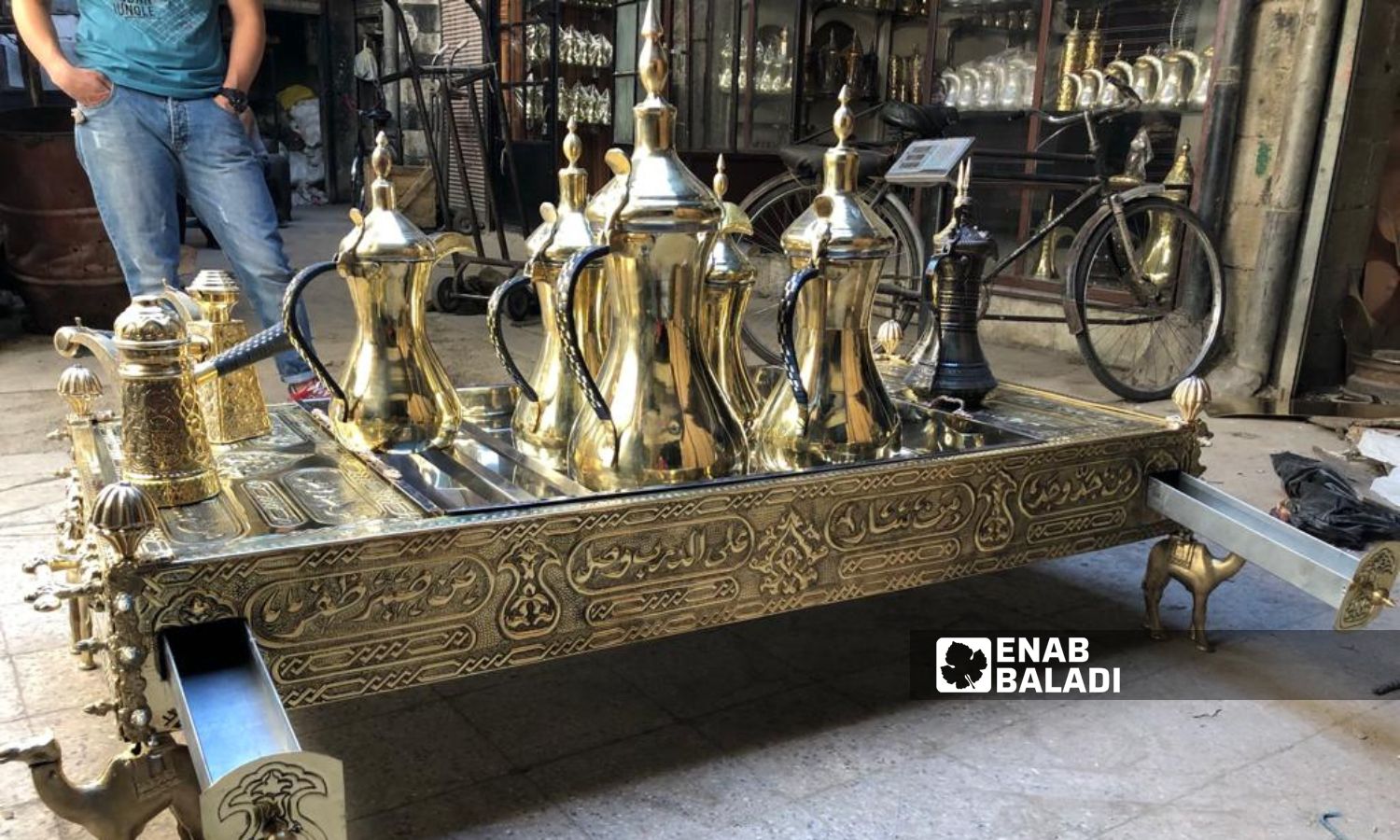



Idlib – Anas al-Khouli
The craft of decorating copper is one of the most important traditional crafts linked to Syrian heritage. In the past, Damascus or Aleppo’s copper markets were bustling with copper art pieces that captivated onlookers and were a destination for tourists, who would make sure to take one of these pieces home as a souvenir.
Like other ancient and traditional crafts, the craft of decorating and engraving copper is facing many problems and difficulties that threaten its extinction. The lack of encouragement for craftsmen, who no longer earn their daily livelihood from this craft, forces them to seek other work.
With many Syrians displaced to Idlib, craftsmen of this trade have faced difficulties that keep them from practicing it, depriving them of continuing the work passed down from their ancestors.
Omar Abdullah, 36, a displaced person from Damascus residing in Idlib, told Enab Baladi that a love and passion story has bound him to the craft of oriental copper for more than 25 years. He was introduced to it on al-Asma’i Street in the Jobar neighborhood of Damascus, grew to love it, and dedicated himself to learning and working in its arts. However, the ongoing war in Syria, specifically in the Jobar area, led to the closure of workshops practicing this craft.
After being displaced to northern Syria in 2018, Abdullah tried to return to his beloved craft but was shocked by a harsh reality. The craft needs a significant amount of capital to buy raw materials and produce some pieces to display for sale, and there is a lack of local and external markets. Thus, he no longer works in it.
While Syrian homes used to be filled with copper items and traditional artistic pieces to decorate homes, owning such products has become an excessive luxury, especially with the deteriorating economic conditions where over 90% of citizens live below the poverty line.
Craftsman Omar Abdullah said that he used to produce many artistic pieces like swords, shields, candle holders, and various household utensils. However, the residents of northern Syria were not accustomed to owning copper items except for the dallah (coffee pot) and the manqal (brazier), and even these items have become antiques that only a few people in society acquire.
Displaced people who love to own various oriental copper items face harsh living conditions that prevent them from even thinking of acquiring such pieces, according to Abdullah.
Craftsman Maher Obaid, 45, displaced from Damascus, wondered how a citizen who cannot find shelter for his children or daily sustenance could afford to own traditional copper pieces. He pointed out that the prices of these pieces are not affordable for people and they do not have the luxury of owning them.
Copper prices vary according to type and craftsmanship. A copper plate starts at $15 (about 225,000 Syrian pounds) and can reach $40. Other artifacts like swords start at $200 and increase based on additional gold or jewelry pieces.
Northwestern Syria is home to 5.1 million people, 4.2 million of whom need assistance, and 3.4 million suffer from food insecurity, with 3.4 million internally displaced and 2 million living in camps, according to the United Nations. Local statistics report 5.5 to 6 million people.
Copper craftsmen in Syria primarily relied on tourists and exporting their products to Gulf countries, where nationals take pride in owning oriental copper items, especially swords, shields, and copper braziers.
Today, craftsmen in northern Syria are unable to export their goods to neighboring countries without knowing the reasons for the ban or the entity preventing the export.
Some craftsmen told Enab Baladi that the Turkish side prevents the export of such handmade industries to protect its local industries and prevent Syrian goods from competing with Turkish ones.
Omar Abdulla said that the crafts used to generate substantial profits by relying on marketing their goods in traditional markets like Souq al-Hamidiyah, frequented by many tourists and traders who order large quantities of pieces for export to Gulf countries and Turkey.
He mentioned that many craftsmen have attempted to export their goods through Turkey, but all attempts failed, forcing craftsmen to look for other professions to provide for their children.
Maher Obaid stated that the situation for craftsmen is dire because the closure of export opportunities forced them to abandon their crafts. He added that he does not know any copper oriental craftsmen who still work in their trade.
Obaid noted that the cessation of craftsmen practicing their craft would lead to its extinction and prevent it from being passed down through generations. He called on government bodies and humanitarian organizations to make greater efforts to ensure the survival of this craft and help craftsmen find external markets to sell their goods.
In northwestern Syria, there are many craftsmen of traditional products linked to Syrian heritage, such as oriental copper, mosaics, stained glass, Aleppo soap, and Ajami woodwork. These craftsmen were forced to stop practicing their crafts due to the lack of markets and their inability to export their goods to neighboring countries.
The ongoing depletion of craftsmen threatens the extinction of these traditional crafts unless supporting entities and de facto governments take an interest and find solutions to ensure the survival and transmission of crafts that are historically linked to Syrians, according to craftsmen interviewed by Enab Baladi.
if you think the article contain wrong information or you have additional details Send Correction